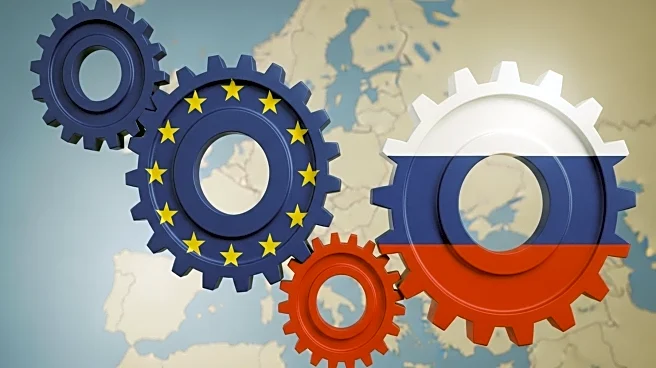What's Happening?
The European Commission has announced a 19th package of sanctions against Russia, aiming to increase pressure on Moscow due to its recent actions that defy international law. The proposal, led by Commission President Ursula von der Leyen, comes in response to Russia's large-scale drone and missile attacks on Ukraine and violations of EU airspace in Poland and Romania. The sanctions include a ban on imports of Russian Liquified Natural Gas, targeting Russia's war economy sustained by fossil fuel revenues. Additionally, the Commission plans to close financial loopholes by imposing transaction bans on certain banks in Russia and third countries. The EU's foreign policy chief, Kaja Kallas, emphasized efforts to sanction individuals involved in the abduction and indoctrination of Ukrainian children.
Why It's Important?
The proposed sanctions reflect Europe's intensified stance against Russia's aggressive actions, highlighting the geopolitical tensions affecting international relations. By targeting Russia's economic lifelines, the EU aims to weaken its war economy, potentially impacting global energy markets and financial systems. The move also underscores the EU's commitment to supporting Ukraine and maintaining regional security. The sanctions could influence U.S. policy, as Western leaders have urged President Trump to adopt a firmer approach towards Russia. Trump's recent ultimatum to NATO allies, demanding coordinated sanctions, indicates potential shifts in U.S.-EU relations and collective security strategies.
What's Next?
The proposed sanctions will be reviewed by EU member states, with potential implementation contingent on their approval. The EU's actions may prompt Russia to retaliate, affecting diplomatic and economic interactions. The international community will closely monitor the situation, as further escalations could lead to broader geopolitical consequences. The U.S. response, particularly President Trump's stance, will be crucial in shaping the future of transatlantic cooperation and collective security measures against Russia.
Beyond the Headlines
The sanctions proposal highlights ethical concerns regarding the abduction and indoctrination of Ukrainian children, drawing attention to human rights violations amid the conflict. The EU's focus on these issues may lead to increased advocacy for international humanitarian efforts and legal accountability. Additionally, the emphasis on diversifying energy sources and investing in low-carbon alternatives reflects long-term shifts towards sustainable energy policies, potentially influencing global climate change initiatives.











